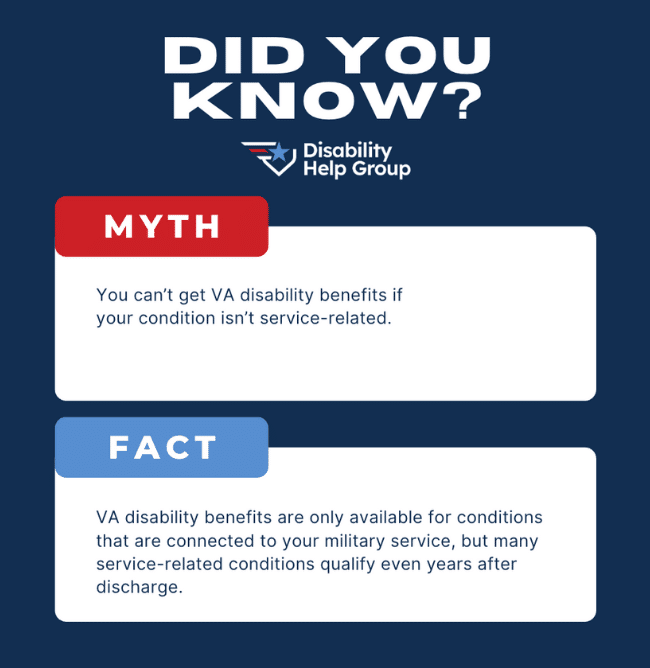How to Win Your Veterans VA Disability Claim
Veterans Disability pays monthly benefits to veterans who are disabled as a result of active duty service. However, it is up to the veteran to prove all the requirements. Generally, VA will approve a VA benefits claim if the veteran proves the following:
- Veteran status
- In-service event, disease or injury
- Current disability
- Medical nexus between the in-service event and the current disability

1. Veteran’s Status
VA does not rely on the dictionary definition of “veteran.” For VA purposes, a veteran is a person who:
- served in the active military, naval, or air service; and
- was discharged or released under conditions other than dishonorable.
The active branches of the U.S. military are:
- Army
- Navy
- Marine Corps
- Air Force
- Coast Guard
Understanding a veteran’s discharge status:
Many veterans assume they cannot win veterans disability benefits if their discharge is not “honorable”. This is a common misconception. To be eligible, the law only requires that the discharge is not dishonorable. If your DD Form 214 says your discharge was honorable, then VA is bound to accept it. However, if you have an alternative discharge – neither honorable nor dishonorable – then VA will investigate what led to your release from service. Afterwards, VA gets to decide whether your service was “dishonorable” for their purposes. Here is a list of alternative discharges:
- General
- Other Than Honorable
- Bad Conduct
- Un-characterized
2. In-Service Event, Disease, or Injury
The following veterans disability examples explain how this works:
A 40 year-old Army combat veteran received an honorable discharge after 2 years of active duty service. He did not suffer any injuries or disorders during service. About 5 years after service, he witnessed a mass shooting at a local mall. A month thereafter, a doctor diagnosed him with PTSD. If he files a claim, VA would deny it because the event that led to the diagnosis happened after his military service.
A 70 year-old Vietnam veteran did not develop any disabilities during service. He spent time on Blue Water Navy ships just off the coast of Vietnam. About 20 years after his honorable discharge, a doctor diagnosed him with non-Hodgkin’s lymphoma. By policy, VA presumes Non-Hodgkin’s lymphoma is related to Agent Orange exposure in Vietnam. VA would likely approve his claim based on Agent Orange exposure.
A 33 year-old Marine Corps veteran injured his knee during a 3-year tour in Iraq. He was diagnosed with a mild ACL sprain and went on light duty for 2 weeks. After light duty ended, he resumed his full duties for another year before his honorable discharge. Two years after service, he tore his ACL in a motor vehicle accident. He then files a claim based on the in-service knee injury. Because the precipitating injury happened AFTER his military service, VA would likely deny his claim.
3. Current Veteran Disability
Even if you can prove an injury in service, you still need a current disability. A current disability is a physical or mental impairment that substantially limits one or more major life activities. If you suspect you have a current disability, then you should see a doctor to confirm.
4. Medical Nexus
Not every VA claim needs a medical nexus letter. In some cases, the link to service is undeniable. For example, if your service records note a disability that you still suffer from today, then VA would probably approve a claim for it without a medical nexus letter. However, what if you don’t have a diagnosis until many years after service? In those cases, VA usually requires a medical nexus letter to confirm the disability is related to service. However, most veterans are not that lucky.
Especially for mental health veteran disabilities, there may be a large time gap from discharge to diagnosis. For example, many veterans respond to traumatic in-service events by avoiding medical treatment. These veterans often try to cope with mental health problems on their own. Coping mechanisms include social isolation and self-medication with drugs or alcohol. When the symptoms get much worse and they finally seek mental health treatment, a doctor renders a diagnosis of PTSD.

